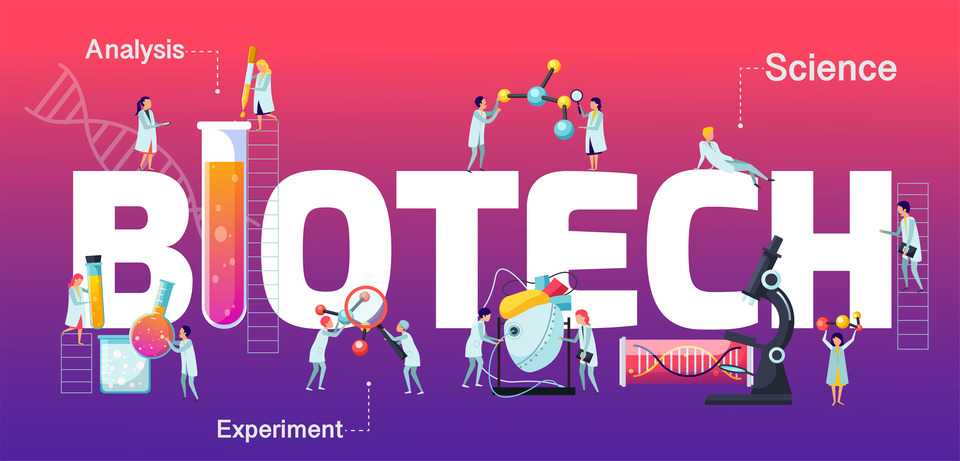Scope of Biotechnology: Unveiling the Expansive Frontier
In an era of scientific advancements, biotechnology has emerged as a revolutionary field with vast potential. This interdisciplinary domain combines biology, chemistry, genetics, and engineering to harness living organisms and biological systems for the benefit of humanity. From healthcare to agriculture, environmental conservation to industrial processes, biotechnology has paved the way for groundbreaking innovations and has become an indispensable tool in various sectors. This blog explores the scope of biotechnology, highlighting the pathways it offers, the diverse array of jobs available, and the promising future outlook it presents.

A rapidly developing discipline that incorporates the principles of biology, chemistry, genetics, and engineering, biotechnology is the subject of the B.Sc Biotechnology, an undergraduate degree programme. To prepare students for various professional paths in this dynamic industry, this programme provides a thorough understanding of biotechnology's fundamental principles and practical applications.
Why pursue a BSc Biotechnology degree?
The discipline of biotechnology is young and increasing both in India and globally. Obtaining a Bachelor of Science (BSc) in Biotechnology is an excellent means of engaging in this dynamic and quickly evolving field. You can work as a scientist, researcher, or entrepreneur in industries including food production, agriculture, and medicine if you have a degree in biotechnology.
You can work in various industries, including agriculture, medicine, and food production, with a bachelor's degree in biotechnology. Additionally, you can use your expertise in multiple sectors, including genetics, molecular biology, and biochemistry. You can also focus on fields like bioinformatics, protein engineering, and nanotechnology.
There are various job options in biotechnology. Biotechnologists work in the agriculture industry to create innovative products and procedures that can increase crop yields while lessening their adverse effects on the environment.
Biotechnologists work in the medical industry to create novel cures and treatments for ailments and diseases. Biotechnologists create better food products and procedures for the food business. Lastly, biotechnologists create microscopic materials and machines in the field of nanotechnology.
Advantages of Biotechnology
The fascinating science of biotechnology has grown tremendously in the last several years. The following are some advantages of this course:
- The multidisciplinary subject of BSc Biotechnology blends technology and biological concepts to provide creative answers to challenging issues.
- It gives students a thorough understanding of the biological sciences and the ability to use that understanding in the biotechnology sector.
- This field can completely change how we create food, medications, and other goods, making it extremely important in today's environment.
- Additionally, it allows students to obtain experience in fields including genetics, biochemistry, molecular biology, and bioinformatics.
- Bioprocessing, biomanufacturing, biomedicine, and bioremediation are among the specialisations available to BSc Biotechnology students.
- With this degree, a student can recognise issues in the biotechnology sector and find solutions.
- To pursue post-secondary education in biotechnology, such as a master's or doctorate, this degree is required.
- The BSc in Biotechnology is an excellent option for students who want to work in the biotechnology sector.
Eligibility Criteria
Students must have an excellent academic background and have finished their 10+2 or equivalent from an accredited board in India to be eligible for admission to a BSc Biotechnology programme. In their 10+2, they must have received at least 60% in biology, chemistry, and physics. Furthermore, passing an entrance exam may require admission to specific colleges.
India's Top BSc Biotechnology program at CGC Jhanjeri
CGC Jhanjeri is home to one of India's top BSc Biotechnology programs. CGC Jhanjeri is situated in Punjab and is a reputable college focusing on industry-oriented education. The CGC Jhanjeri BSc Biotechnology program provides students with a thorough curriculum and hands-on training to prepare them for a successful career in the biotechnology industry.
Here are some key features of the BSc Biotechnology program at CGC Jhanjeri:
- The program's curriculum is designed to provide a strong foundation in core subjects such as cell biology, genetics, microbiology, biochemistry, and bioprocess engineering. The coursework is carefully crafted to cover both theoretical concepts and practical applications of biotechnology.
- Modern labs, well-equipped classrooms, and cutting-edge research facilities are all available at CGC Jhanjeri. Students in the BSc Biotechnology program get access to the most up-to-date biotechnology tools and technology, allowing them to perform experiments and research firsthand.
- The instructors at CGC Jhanjeri are skilled experts who bring their field knowledge to the classroom. They help students by offering insightful advice and support, ensuring they are well-equipped to fulfil market expectations.
- The course strongly emphasises hands-on learning and offers students the chance to do internships at prestigious biotechnology firms. These internships allow students to put their learning to use in practical situations, network with professionals in related fields, and hone crucial skills to grab the best career opportunities after biotechnology.
- Strong relationships between CGC Jhanjeri and the biotechnology sector enable guest lecturers, workshops, and industry visits. College students can also receive career and internship placement assistance at reputable biotechnology firms.
The BSc Biotechnology programme is an excellent programme that gives students a strong foundation in biotechnology and equips them for prosperous careers in this fast-paced industry. It is an excellent option for aspiring biotechnology professionals due to its extensive curriculum, practical training, instructors with experience in the field, and career opportunities. The CGC Jhanjeri guarantees that students have the knowledge and expertise essential to succeed in the cutthroat biotechnology industry through industry partnerships and placement assistance.
Career Scope of Biotechnology
Beyond academic institutions and research labs, biotechnology has many applications. It provides a wide range of professional prospects in numerous industries. Jobs in biotechnology that are in high demand include:
Research Scientist: In biotechnology, research scientists are involved in the planning and carrying out of tests, data analysis, and the development of new technologies. They operate in various fields, including bioprocess development, genetic engineering, and medication discovery.
Biomedical Engineer: Medical device, prosthesis, and imaging system design is done by biomedical engineers using engineering concepts. They work with healthcare experts to provide cutting-edge solutions that enhance patient care and treatment results.
Bioinformatics Specialist: Bioinformatics is essential for analysing and interpreting biological data in the age of big data. Bioinformatics specialists use computational tools and methods to organise, analyse, and visualise large-scale biological data sets.
Quality Assurance Manager: In biotech firms, managers monitor product quality and assure regulatory compliance. They manage the production process and create and implement quality control measures.
Sales and Marketing Representatives: They are essential to biotechnology companies' efforts to market their goods and services. These experts have a solid scientific foundation and can clearly explain the advantages of biotech products to clients.
Future Outlook:
The future of biotechnology appears promising, with several factors contributing to its growth and expansion:
Technological Advancements: The creation of new biotechnological tools is accelerated by the quick development of gene editing methods, genome sequencing, and synthetic biology. These developments are anticipated to pave the way for innovations in personalised treatment, disease prevention, and sustainable agriculture.
Increased Investment: Recognising the potential of biotechnology, governments, businesses, and venture capitalists are spending a lot of money on research and development. This increase in funding is encouraging innovation and hastening the conversion of discoveries into practical uses.
Global Challenges: Climate change, infectious diseases, and food security are just a few of the issues biotechnology is well-positioned to tackle. To address these issues, it will be essential to create vaccinations, increase agricultural output, and engineer microbes for sustainable production.
Ethical Considerations: Climate change, infectious diseases, and food security are just a few of the issues biotechnology is well-positioned to tackle. To address these issues, it will be essential to create vaccinations, increase agricultural output, and engineer microbes for sustainable production.
The biotechnology field is quite broad and provides a wide range of career scopes in Biotechnology. Biotechnology is at the vanguard of innovation, addressing environmental problems, advancing industrial processes, and enhancing healthcare and agricultural practices. The forecast for biotechnology is quite optimistic due to continued technological development, increased investment, and the capacity to address global concerns. Taking an interest in this area can result in fulfilling professions and help to create a more sustainable and healthy future for humanity.



















